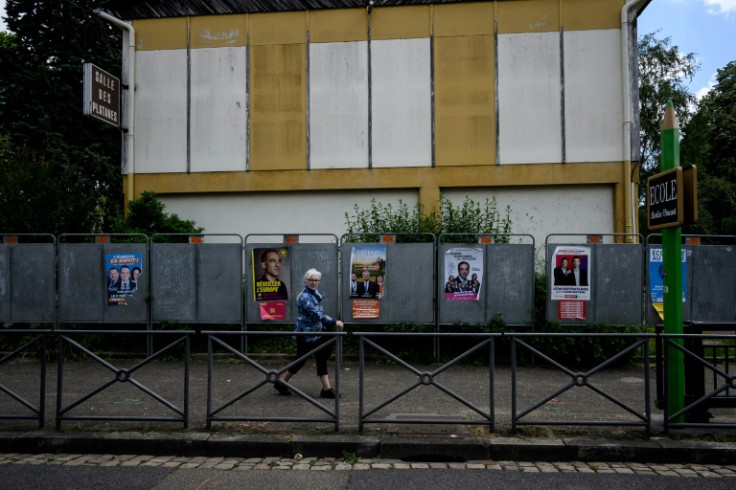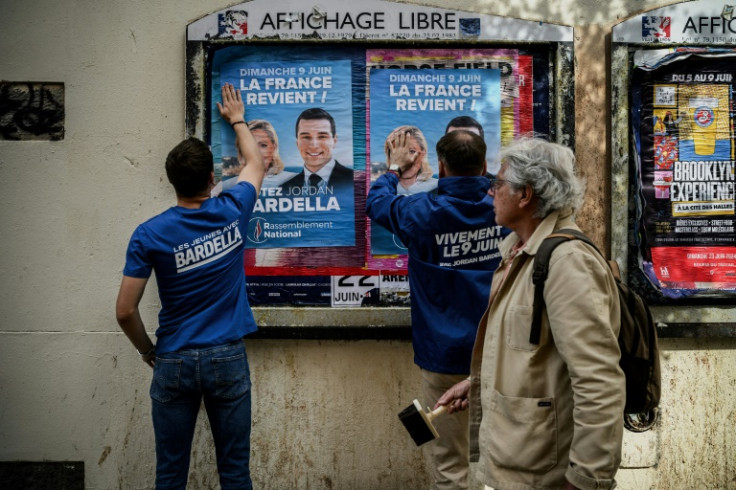Frustrated Voters Bet On Far Right Saving France 'In Tatters'

Standing outside the Catholic school where he teaches in eastern France, Charles Lauvergne said he was unsurprised the far right did so well in last week's European elections.
"It's logical when you look at France's deterioration," said the 38-year-old maths teacher.
"We pay tons of taxes for a country that no longer functions... There is insecurity and uncontrolled immigration," he said in the well-off village of Tassin-la-Demi-Lune.
Lauvergne was one of more than seven million people across France to vote for the far-right National Rally (RN) of three-time presidential contender Marine Le Pen in the European polls.
Voters from traditional right-wing strongholds such as Tassin-la-Demi-Lune chose them over crime, immigration and living costs.
The RN topped the poll in 93 percent of France's 35,015 voting districts, a huge surge from 71 percent in the 2019 European elections.
And voters say they are prepared to support the RN -- helmed by Le Pen and 28-year-old party chief Jordan Bardella -- in the upcoming legislative elections.
French President Emmanuel Macron dissolved parliament and called snap elections for June 30 and July 7 after the far right trounced his centrist alliance in the European elections.
In Tassin-la-Demi-Lune, Lauvergne said he hoped to see the RN take charge, even though the party has little governing experience.
"It's better for the country to be in a bit of chaos than to leave it to die a slow death," he said.
Regine, a 62-year-old who did not give her second name, said "life is good" in the town, where the median income is around 29,000 euros ($31,300) compared to France's national average of 23,160.
But over the weekend, the retired nurse and her husband voted for the RN for the first time.
"We wanted to give it a go," she said, citing disappointment in Macron and the war in Ukraine but also young people's lack of manners as factors.
Tassin-la-Demi-Lune had voted for Macron over Le Pen in the 2022 presidential election, but this time, the Lyon suburb went for the RN with Bardella at the top of the ticket.
Sitting not far off on a bench with her son on her knees, 35-year-old Cecile said France was "in tatters" and she was alarmed by a "loss of values".
She listed a number of policies she disagrees with, including medically assisted fertility treatment, surrogacy, and moves to legalise assisted dying.
"That's why we're looking for something else and why we're interested in Reconquest," she added, referring to a smaller far-right outfit that won eight percent of Tassin's votes.
Centre-right voter Max, 87, said he was "very surprised" by the far right's breakthrough in his "privileged" town.
But Tassin-la-Demi-Lune is far from unique.
Hundreds of kilometres away from Tassin, residents in western France share similar concerns over crime, immigration, and purchasing power.
But until the RN took first place in Sunday's election with nearly 26 percent of the vote, Brittany was considered a pro-European centrist bastion.
"Here, like everywhere, people can no longer make a decent living," said Manuel, 72, in the village of Bain-de-Bretagne.
"People like to hate the RN, but it's the only party tackling the real issues: purchasing power, immigration, the loss of law and order," he added.
The son of a Spanish immigrant, Manuel still considers himself a "leftist", as a longtime supporter of the communist party.
"But I can't stand champagne Socialists anymore," he said.
Sitting at a picnic table, a 20-year-old cleaner explained she too voted for Bardella's "ideas" and to "counter Macron".
In 2022 she voted for Le Pen, she said, including over her concerns on immigration and Macron's "attitude" towards the 2018-19 anti-government "yellow vests" movement.
She said it was "pretty normal" voting for the RN in her circle -- a sentiment a number of Bain-de-Bretagne residents reiterated.
Alex, a law student in Rennes, at first hesitated to vote for the RN but has since come around.
"Their line has significantly softened, and it was much closer to my ideas than the other parties," she told AFP.
A 39-year-old shopkeeper in Bain-de-Bretagne who voted left wing and asked to remain anonymous blamed television for talking about immigration and crime "on loop".
"There's not a lot of diversity here, no insecurity. And yet, the people who vote for the RN mostly talk about immigration and crime," he said.


© Copyright AFP 2025. All rights reserved.





















